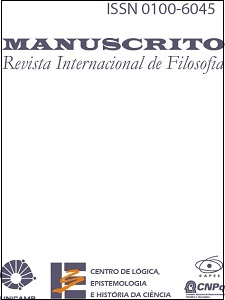Resumo
The main concern of this paper is the justification of the axioms of Zermelo-Fraenkel set theory, either as true statements about a concept of set (if we consider set theory as a conceptual theory) or, alternatively, as true statements about abstract objects (considering ZFC as an objectual theory). I want to argue here that, in either case, set theory can be seen as a body of knowledge largely built on intuitive foundations (rather than an instrumental theory conceived mainly for pragmatic purposes, the needs of mathematics in particular). I call this inquiry “phenomenological” for it approaches its subject from the perspective of the intentional acts that originate sets as doubly dependent objects (of other objects – their elements – and of a subject – taken here simply as the abstract form of a real subject – who collects these elements into a set). Such an inquiry, I believe, brings to light the essential characters of sets as objects or, alternatively, the concept of set, which the axioms of the theory (or at least most of them) express.Referências
BELAGA, E. “Are We Really Living in the World Where the Power Set
Axiom is a Universal Mathematical Truth?”. Département de Mathématique, Institut de Recherche Mathématique Avancée, Université Louis Pasteur, 1988.
DA SILVA, J. J. “The Axioms of Set Theory”. Axiomathes, 13(2), pp. 107-
, 2002.
FEFERMAN, S. “Does Mathematics Need New Axioms?”. American
Mathematical Monthly, 106, pp. 99-111, 1999.
_________. “Why the Program for New Axioms Need To Be Questioned”.
Bull. Symbolic Logic, 6(4), pp. 401-413, 2000.
FINE, K. “Ontological dependence”. Proc. Arist. Soc., 95, pp. 267-290, 1995.
GABBAY, D. V. & WOODS, J. (eds.). Handbook of the History of Logic. The Rise of Modern Logic: From Leibniz to Frege (v. 3). Amsterdam: Elsevier, 2004.
GÖDEL, K. “Russell’s Mathematical Logic”. In: P.A. Schilpp (ed.) (1944),
pp. 123- 153.
HUSSERL, E. Erfahrung und Urteil: Untersuchungen zur Genealogie der Logik. Hamburg: Glaassen & Goverts, 1954.
JECH, T. J. (ed.). Axiomatic Set Theory II. Proceedings of Symposia in Pure Mathematics, 13. Providence, RI: American Mathematical Society,
LEAR, J. “Sets and Semantics”. J. Phil., 74, pp. 86-102, 1977.
MADDY, P. “Believing the Axioms”. J. Symbolic Logic, 53, pp. 481-511, 736-764, 1988.
POLLARD, S. Philosophical Introduction to Set Theory. Notre Dame: University of Notre Dame Press, 1990.
POTTER, M. Set Theory and its Philosophy. Oxford: Oxford University Press, 2004.
SCHILPP, P. A. (ed.). The Philosophy of Bertrand Russell, Library of iving Philosophers. New York: Tudor Publishing Co, 1944.
SCOTT, D. “Axiomatizing Set Theory”. In: T.J. Jech (ed.) (1974), pp. 207-214.
SHOENFIELD, J. R. Mathematical Logic. Reading, MA: Addison-Wesley,
TIESZEN, R. “Husserl’s Logic”. In: D.V. Gabbay and J. Woods (eds.)
(2004), pp. 207-321.

